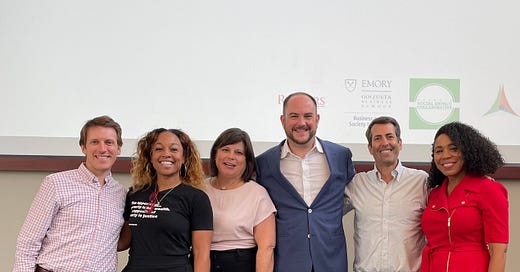Building an Ecosystem Around Shared Ownership
The start of a guide for would-be network weavers
TLDR: If you want to help build up an ecosystem in your own city, here are some ideas from our recent efforts in Georgia.
Background: Last week I went to Atlanta, Georgia, to help facilitate a convening on shared ownership put on by The Rutgers Institute, The Atlanta Wealth Building Initiative, Goizueta’s Business & Society Institute, and The Georgia Social Innovation Collaborative. The Georgia Center for Employee Ownership led a 101 session, too.
The hosts are still gathering notes and resources from the day, but here are some quick takeaways and resources.
First, our read-ahead has the agenda for the day, the list of participants, and background on shared ownership, employee ownership, and business ownership by women and people of color in Georgia. The read-ahead proved even more useful than we’d hoped in getting participants up to speed on a tangle of topics.
If you look through the agenda, you won’t find a lot of content there. That’s by design—we wanted the day to be conversational, generative, and inclusive as we could make it.
We also put up a shared Google Drive (email me for the link!) for participants to upload their own resources, share upcoming events, and post more about their organization’s work.
We built out our invite list from the networks of our local partners, then from our invitees’ networks. We had hoped for 15-20 participants, which ballooned to 60 (!). I wouldn’t be surprised if there were similar latent interest in other cities around the country.
We hosted the event at one of Emory’s flattest classrooms, also by design.
A few scattered takeaways:
There is a tremendous amount of activity going on in Georgia, as you’ll see in the read-ahead and as you can tell from the list of participants. This may have been the first convening of its kind in Georgia, but it isn’t where the work started.
A lot of what this ecosystem-building work requires is just time. One of the participants pointed out that it took almost a decade of beating the drum about B Corporations before he had to stop explaining them to every person he met.
Having a university host the event was critical. The Emory team organized meals from local Black-owned business; managed a registration page; set up a Google Sheet to track invitations, registration responses, and dietary restrictions; organized supplies for the day; and a thousand other things I wouldn’t have thought about until the morning of the event.
Having a specific focus helped us curate the day. Our focus was on the role shared ownership could play in addressing the racial wealth gap. But in another city (and in Georgia, too!), that focus could be nudging large employers toward worker voice or employee ownership, or protecting vulnerable communities through neighborhood trusts, or preserving and developing rural economies, or supporting women-led businesses.
One of the big questions in the room was how to use these models—or create new ones—to benefit Black business owners. But according to AWBI research, over 90% of Black-owned businesses have zero employees. The group just began to crack open whether/how secondary cooperatives, shared service cooperatives, or multi-business purpose trusts could address their needs.
Watch this space—and keep an eye on Georgia!




